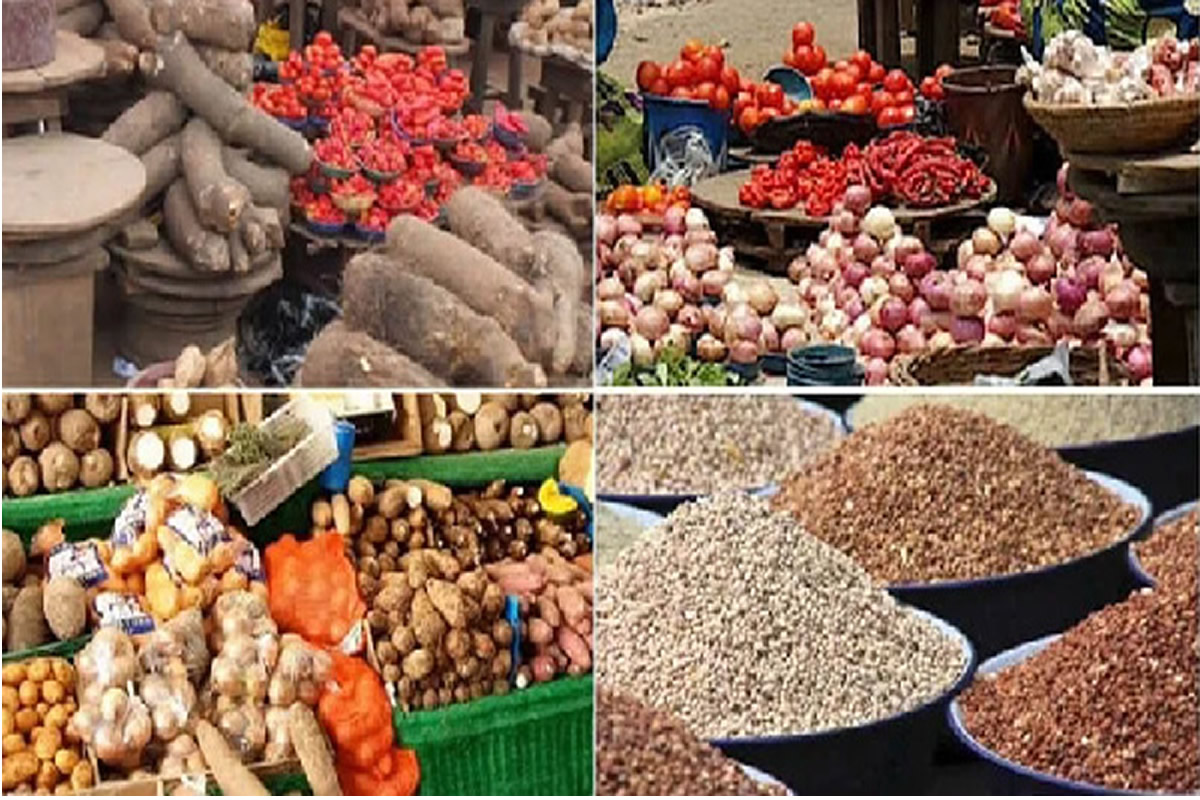•Farmers decry worsening insecurity, FG promises intervention
The cost of food items in Nigeria has been recording significant increases in the past one year.
A survey carried out by our correspondents in markets across Lagos, Ogun and Federal Capital Territory showed that staple food commodities have witnessed astronomical price hikes.
Findings showed that within a one-year period, the cost of 50kg of beans rose by about 253 per cent, a basket of tomatoes leaped by 123 per cent, while the price of 50kg of rice rose by 51.48 per cent.
Other commodities such as bread, garri and onions also witnessed sharp increases in their prices during the period under review.
The food commodities surveyed included rice, beans, garri, maize, tomatoes, onions and bread, while the time frames examined were July 2020, January 2021 and July 2021.
In July 2020, the cost of one mudu of rice was N420.63, while 50kg of rice was between N21,125 and N28,500.
A price increase occurred in January 2021, with one mudu of rice rising to N500, while 50kg of rice was between N23,750 and N24,500.
The increase continued until in July 2021 as one mudu of rice rose to N1,100, while 50kg of rice increased to an average of N32,000.
As of July 2020, one mudu of beans cost N305.48, while 50kg of beans was N12,750.
However, by January 2021, the price of a mudu of beans had climbed to N373, while 50kg of beans was N30,000.
The increase continued in July 2021, with one mudu of beans costing N900, while 50kg of beans had risen to N45,000.
Between July 2020 to January 2021, the cost of a 1kg and onions rose from N180.56 to N411, while one big bag of onions climbed from N17,000 to N21,500.
In July 2020, the cost of one mudu of garri was N247.62, while 50kg of garri was N11,500.
A price increase occurred in January 2021, with one mudu of garri selling for N300, while 50kg of garri sold between N10,750 to N11,125.
The increase continued until in July 2021 with one mudu of garri going for N450 while 50kg of garri sold for N14,500.
In July 2020, a mudu of maize was sold for N186.89 to N184.52, while 50kg of maize was N17,500 to N17,250.
A price increase occurred in January 2021 with one mudu of maize selling for N216 to N230, while 50kg of maize was N20,000 to N20,167.
The increase continued in July 2021 with one mudu of maize selling N400, while 50kg of maize sold between N22,000 and N24,000.
In July 2020, the cost of 1kg of tomatoes was N284.49, while a big basket of tomatoes was N8,500.
A price drop occurred in January 2021 with 1kg of tomatoes going for N152, while a big basket of tomatoes sold for N6,500.
However, as of July 23, 2021 when this report was filed, 1kg of tomatoes cost N1,000, while a big basket of tomatoes was sold for N19,000.
The cost of bread continued to rise steadily within the review period.
As of July 2020, the cost of one loaf of bread was N375. The same unit was sold for N500 in January 2021 and N600 as of July 2021.
The composite food index (a measure of food inflation) rose to 21.83 per cent in June compared to 22.28 per cent in May 2021, according to the National Bureau of Statistics.
This rise was caused by increases in prices of bread and cereals, potatoes, yam and other tubers, milk, cheese and eggs, fish, soft drinks, vegetables, oils and fats, and meat.
In January, food inflation was 20.57 per cent, compared to 19.56 per cent in December 2020. This rise was caused by increases in prices of bread and cereals, potatoes, yam and other tubers, meat, fruits, vegetable, fish and oils and fats.
In June 2020, food inflation was 15.18 per cent. An increase caused by increases in prices of bread and cereals, potatoes, yam and other tubers, fruits, oils and fats, meat, fish and vegetables.
According to the NBS, food inflation on a year-on-year basis was highest in Kogi (30.34 per cent), Enugu (25.18 per cent) and Kwara (24.78 per cent), and lowest in Bauchi (18.97per cent), River (18.92per cent) and Abuja (17.09per cent) in June, 2021.
On month-on-month basis, food inflation was highest in Jigawa (2.67 per cent), Edo (2.43 per cent) and Cross River (2.16 per cent), and lowest in Lagos (0.14 per cent), Borno (0.06 per cent) and Kwara (0.02 per cent) in June, 2021.
Farmers decry worsening insecurity
Farmers attributed the hike in food prices to insecurity, climate change and lack of access to inputs, among others, but made particular emphasis on the widespread level of insecurity nationwide.
“Insecurity is the major problem confronting farmers right now. Insecurity is everywhere in Nigeria currently,” the National Vice President, All Farmers Association of Nigeria, Chief Daniel Okafor, said.
He added, “Security is a basic necessity in life and so what caused the hike in food prices, first of all, is insecurity. The second is climate change, while farmers and herders’ clashes, which is part of insecurity, is the next concern.
“Farmers are being kidnapped, raped and killed. Banditry is on the rise; everyone is scared and insecurity is getting worse. This, of course, will have a negative effect on agriculture.”
Also, the National President, Maize Growers, Processors and Marketers Association of Nigeria, Dr Edwin Uche, observed that while there were other factors that caused food price hike, insecurity was the number one factor.
“While there are many other factors that contributed to this, security challenge in Nigeria now is the key factor. We can’t rule out the effect of security challenge on the cost of food items. In fact, for me it is number one,” he said.
He added, “Also, we are not out of the COVID-19 circumstances. The pandemic affected the global economy and some of the key sectors that were adversely impacted include the agricultural production industries.
“And if you cannot produce, if you can’t move to the farm, if you can’t have access or convey inputs from one location to the other, it makes it difficult for us to grow our commodities.”
The President of the South-West Farmers Association of Nigeria, Dr Tai Oyekan, speaking with our correspondent, said that rising food prices were caused by varied factors from structural imbalance to improper agricultural interventions.
Oyekan said, “Garri and flour (lafun), two of our staple foods in this part of the country are by-products of cassava stems. Today, these food items, amongst others, are not easily obtainable by the common man again. Their prices are not within the reach of our communities.
“A tonne of cassava as of March 2020 was N18,000. However, it is hovering between N65,000-N70,000 per tonne as of now, July 2021. Same with rice. Despite the ban on the importation of foreign rice into the country, the price per bag keeps rising.
“The locally produced ones, such as Ofada are even more expensive than the imported ones. Some two years ago, we used to buy rice in Lagos markets between N16,000 and N20,000. Now it hovers between N25,000 and N30,000.
“The prices of spices like onions, tomatoes, locust beans, and so on are just too prohibitive for an average housewife to make a pot of soup.
“When you want to go beyond your boundary, attempt to add some protein in form of fish or beef nobody will tell you before you will decide to go protein-less and accept your fate.
The President of the Premium Bread Makers Association of Nigeria, Emmanuel Onuorah, said government surcharges and poor foreign exchange policies were key factors driving the inflation of prices of flour and bread.
He said, “Between March last year and now, we’ve had a 60 per cent increase in the price of flour. In the last two weeks, flour has added about N3,000. In Lagos, a bag of flour goes for N17,600. It’s scarce in Abuja and goes for N19,000. In the East and North, there is no flour.
“Recently, the Federal Ministry of Industry, Trade and Investment called us to Abuja along with the millers. The millers complained that the cumulative surcharge on them for the importation of wheat was 30 per cent. Also, the cost of diesel to fire our burners is N300. Pre-COVID it was N130.”
He said that Nigerians consume about 4.47 million metric tonnes of wheat, which is used in the production flour, and the nation is only able to grow 60,000 metric tonnes of it.
He added, “The shortfall is what we import. So, you can see we don’t even have enough capacity to grow wheat yet they’re taking a sizable percentage from the millers for the wheat development programme.
“So, overall, the price of diesel, cost of shipment, the surcharge, and worst of all, the foreign exchange problems have contributed to what we have now. The Federal Government doesn’t provide the millers with foreign exchange; they source that from the parallel markets.
“As I speak to you, bakeries are going under with the attendant job losses. The price of inputs including eggs, sugar preservatives, and so on have gone up. If care is not taken and the government doesn’t provide millers with preferential foreign exchange, we may be getting bread at N1,000.”
A farmer based in Aiyetoro, Ogun State, Israel Adegbola, lamented the challenge of low rainfall.
Adegbola said, “I planted cassava and cocoa, and presently, there is no rainfall. I don’t know how the government can help us as this is a major challenge.”
Another farmer from Akure, Ondo State, George Oladapo, said that the state government had intervened to stem the herdsmen crisis.
 Gistfox Your News Window To The World
Gistfox Your News Window To The World 




